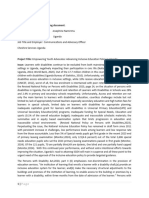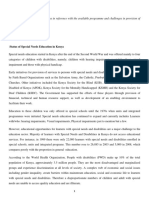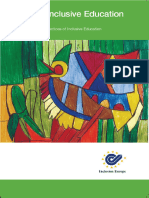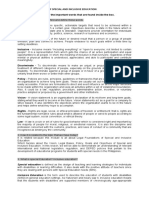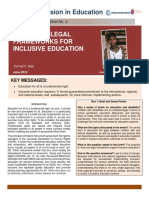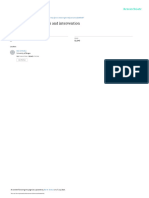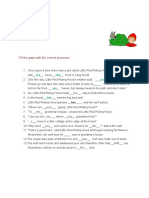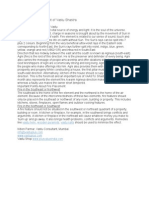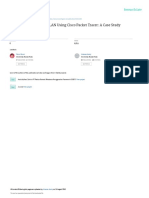COLLEGE OF EDUCATION AND EXTERNAL STUDIES.
Department of Foundations and Curriculum Studies.
YEAR III SEMESTER I 2025/2026
NAME : TUMWESIGYE PENINA
STUDENT NUMBER : 2300724538
REGISTRATION NUMBER :23/U/24538/EVE
PROGRAMME : BAED
COURSE : PSE3101, SPECIAL NEEDS EDUCATION.
COURSE FACILITATOR : DR. WANDERA ROGERS
QUESTION :Discuss the different Legislations of Special Needs Education in
Uganda.
DATE: 5th September, 2025
SIGNATURE: …………………………...
�Special needs education is the education of children with disabilities or unusual challenges. It is a
specially designed instructions to meet the unique needs and abilities of disabled and gifted
students. Special needs education in Uganda is primarily governed by a framework of legislation
aimed at ensuring inclusive and equitable access to education for all children, including those
with disabilities. This legislative landscape has evolved over time, reflecting a growing
commitment to the rights of individuals with special needs.
Legislation concerning special needs education aims to ensure that individuals with disabilities
receive appropriate educational opportunities tailored to their unique needs. This body of law
typically mandates the provision of free and appropriate public education (FAPE) for all children
with disabilities, emphasizing individualized instruction and support services.
Key principles often include the least restrictive environment (LRE), which dictates that
students with disabilities should be educated alongside their non-disabled peers to the maximum
extent possible, and the development of individualized education programs (IEPs) or similar
plans. These legal frameworks often outline procedures for identification, evaluation, and
placement of students with special needs, as well as due process rights for parents and guardians.
Historically, the evolution of special education legislation has moved from a focus on
segregation to inclusion, recognizing the civil rights of individuals with disabilities to access
quality education). Such laws typically cover a broad range of disabilities, including learning
disabilities, intellectual disabilities, emotional disturbances, autism spectrum disorders, and
physical impairments, among others. They also often address funding mechanisms, teacher
qualifications, and the provision of related services such as speech therapy, occupational therapy,
and psychological services, which are deemed necessary for a student to benefit from special
education
One of the foundational pieces of legislation that has influenced SNE in Uganda is the The
Constitution of the Republic of Uganda, 1995. While not exclusively focused on education, the
Constitution provides a broad framework for human rights, including the right to education for
all citizens. Article 30 of the Constitution states that "All persons have a right to education." It
lays the groundwork for equality and non-discrimination, thereby implicitly supporting the right
�to education for all citizens, including those with special needs. This constitutional mandate is
further elaborated and operationalized through specific acts and policies. Furthermore, Article 35
specifically addresses the rights of persons with disabilities, stating that "Persons with disabilities
have a right to respect and human dignity and the State and society shall take all appropriate
measures to ensure their full enjoyment of rights and fundamental freedoms." This constitutional
provision lays the groundwork for subsequent legislation to specifically address the educational
needs of individuals with disabilities, ensuring that they are not discriminated against and have
equal opportunities to access education.
Another impactful legislation is the Persons with Disabilities Act, 2006. This Act is a landmark
piece of legislation that aims to promote and protect the rights of persons with disabilities in
Uganda. It is comprehensive in its scope, covering various aspects of life, including education.
Section 10 of the Act specifically addresses education, stating that "A person with a disability
has a right to education without discrimination and on the basis of equal opportunity." The Act
further mandates that the government shall take appropriate measures to ensure that persons with
disabilities have access to inclusive, quality, and free primary and secondary education on an
equal basis with others. This includes providing reasonable accommodation, such as accessible
learning materials, assistive devices, and qualified teachers. The Act also encourages the
integration of children with disabilities into mainstream schools, promoting an inclusive
education model. It places a responsibility on educational institutions to make necessary
adjustments to accommodate learners with disabilities, thereby fostering an environment where
all students can learn and thrive together.
The Persons with Disabilities Act (2006) is another significant piece of legislation that reinforces
the rights of individuals with disabilities, including their right to education. This Act prohibits
discrimination against persons with disabilities and mandates reasonable accommodation in
educational settings (Persons with Disabilities Act, 2006). For example, it could be cited in cases
where a school refuses admission to a child with a physical disability without providing
justifiable reasons or making necessary modifications to the learning environment.
�Disability (2006) provides a comprehensive framework for addressing the rights and needs of
persons with disabilities across various sectors, including education. This policy advocates for
the removal of barriers to education, such as inaccessible infrastructure and discriminatory
attitudes, and promotes the provision of necessary support services (Uganda National Policy on
Disability, 2006). An example of its impact is the encouragement of accessible school buildings
and the provision of assistive devices for learners with visual or hearing impairments. At its core,
the policy recognizes disability not merely as an individual medical condition but as a complex
phenomenon resulting from the interaction between impairments and attitudinal and
environmental barriers that hinder full and effective participation in society on an equal basis
with others. This social model of disability underpins the policy's approach, shifting the focus
from fixing the individual to removing societal barriers. It acknowledges that persons with
disabilities, like all citizens, possess inherent dignity and rights, and that their exclusion from
mainstream society represents a significant loss to national development. The policy is
structured to address various facets of life for persons with disabilities, including health, social
protection, employment, justice, and crucially, education. It advocates for a multi-sectoral
approach, recognizing that the challenges faced by persons with disabilities are interconnected
and require coordinated interventions from different government ministries, civil society
organizations, and communities.
The Education Act, 2008 is also a pivotal piece of legislation directly addressing education in
Uganda. This Act, which repealed the earlier Education Act of 1970, provides a comprehensive
legal framework for the management and administration of education services. While it does not
have a dedicated section solely for SNE, it incorporates principles of inclusivity. For instance,
the Act emphasizes the importance of providing education for all children, implicitly including
those with special needs. It mandates the establishment of educational institutions and the
provision of educational services, which, by extension, should cater to diverse learning needs.
The Act also empowers the Minister responsible for education to make regulations for the better
carrying out of the provisions of the Act, which can include specific regulations for SNE. For
example, the Act's general provisions on curriculum development and teacher training can be
�interpreted to include the need for adaptations and specialized training to cater to learners with
disabilities.
Furthermore, the Universal Primary Education (UPE) Policy and the Universal Secondary
Education (USE) Policy, while broad educational policies, have implications for SNE. These
policies aim to provide free and compulsory education for all children at primary and secondary
levels, respectively. While they do not specifically detail SNE provisions, their universal nature
means that children with disabilities are also entitled to benefit from these programs. The
challenge, however, lies in ensuring that the implementation of UPE and USE is genuinely
inclusive and addresses the specific needs of learners with disabilities, which is where the more
specific SNE legislations and policies come into play. For example, while UPE ensures free
primary education, the Persons with Disabilities Act ensures that a child with a physical
disability can access a school with ramps and accessible toilets.
The National Teacher Policy, 2019 also plays a crucial role in supporting SNE. This policy
recognizes the importance of equipping teachers with the necessary skills and knowledge to cater
to diverse learners, including those with special needs. It advocates for the integration of SNE
components into teacher training curricula and continuous professional development programs.
This ensures that teachers are better prepared to identify, assess, and support learners with
disabilities in mainstream classrooms, thereby promoting inclusive practices. For instance, the
policy might recommend modules on differentiated instruction or behavior management for
students with autism spectrum disorder.
In summary, Uganda's legislative framework for special needs education is built upon
constitutional principles and further elaborated through specific acts and policies. These laws
aim to ensure the right to education for all children with disabilities, promote inclusive practices,
and prohibit discrimination, with ongoing efforts to translate these legal provisions into tangible
improvements in educational access and quality. The constitution of the Republic of Uganda,
1995) provides the fundamental right to education and protection against discrimination. The
Education Act, 2008 sets the general framework for education, while the Persons with
�Disabilities Act, 2006 is the most direct and comprehensive legislation specifically addressing
the rights and educational needs of individuals with disabilities. These legislations,
complemented by various policies and guidelines, aim to foster an inclusive education system
where all learners, regardless of their abilities, have equal opportunities to access quality
education and realize their full potential. The ongoing challenge lies in the effective
implementation and enforcement of these legislations to ensure that the rights of learners with
disabilities are fully realized in practic
�References
1. Government of Uganda. (1995). _Constitution of the Republic of Uganda_. WIPO Lex.
2. Government of Uganda. (1995). _Uganda National Institute of Special Education Act (Cap.
138)_. Uganda Legal Information Institute.
3. Government of Uganda. (2008). _The Education Act, 2008_. Uganda Legal Information
Institute.
4. Government of Uganda. (2016). _Children (Amendment) Act, 2016_. Uganda Legal
Information Institute.
5. Government of Uganda. (2020). _Persons with Disabilities Act, 2020_. Uganda Legal
Information Institute.
6. Ministry of Gender, Labour and Social Development. (2006). _National Policy on Disability_.
Government of Uganda.
7. Ministry of Education and Sports. (2011). _Draft Inclusive Education Policy_. Government of
Uganda
8. Republic of Uganda. (National Council for Disability Act, 2013). (Print)
9. United Nations. (2006). _Convention on the Rights of Persons with Disabilities (CRPD)_.
United Nations Treaty Collection.
10 Republic of Uganda. (National Council for Disability Act, 2013). (Print)
11. UNESCO. (Universal Primary Education (UPE) Policy: A Case Study of Uganda).
(Academic Journal)






